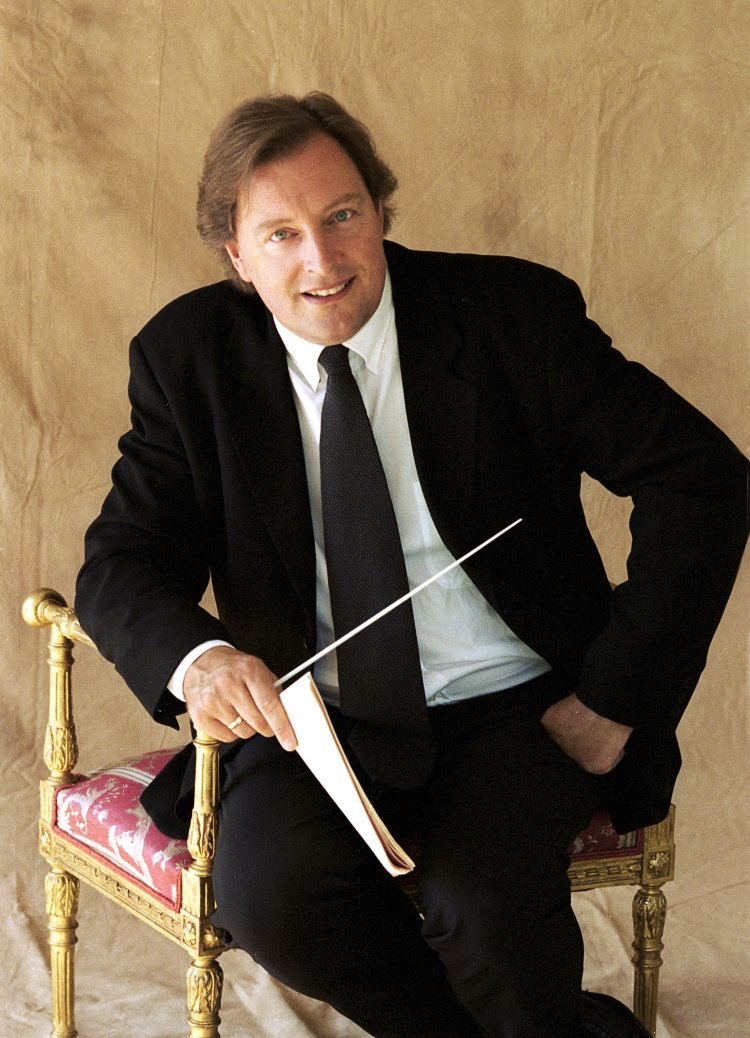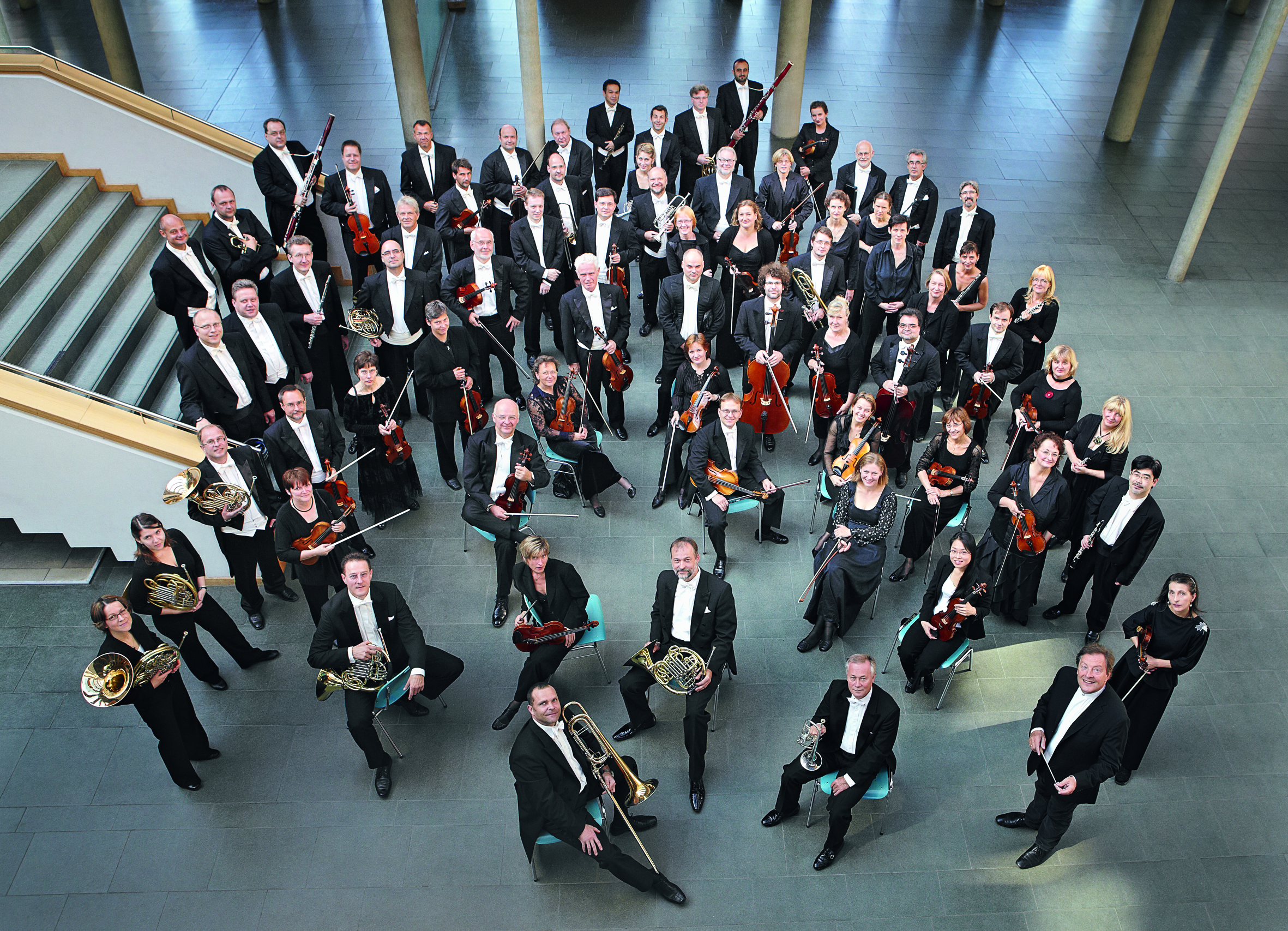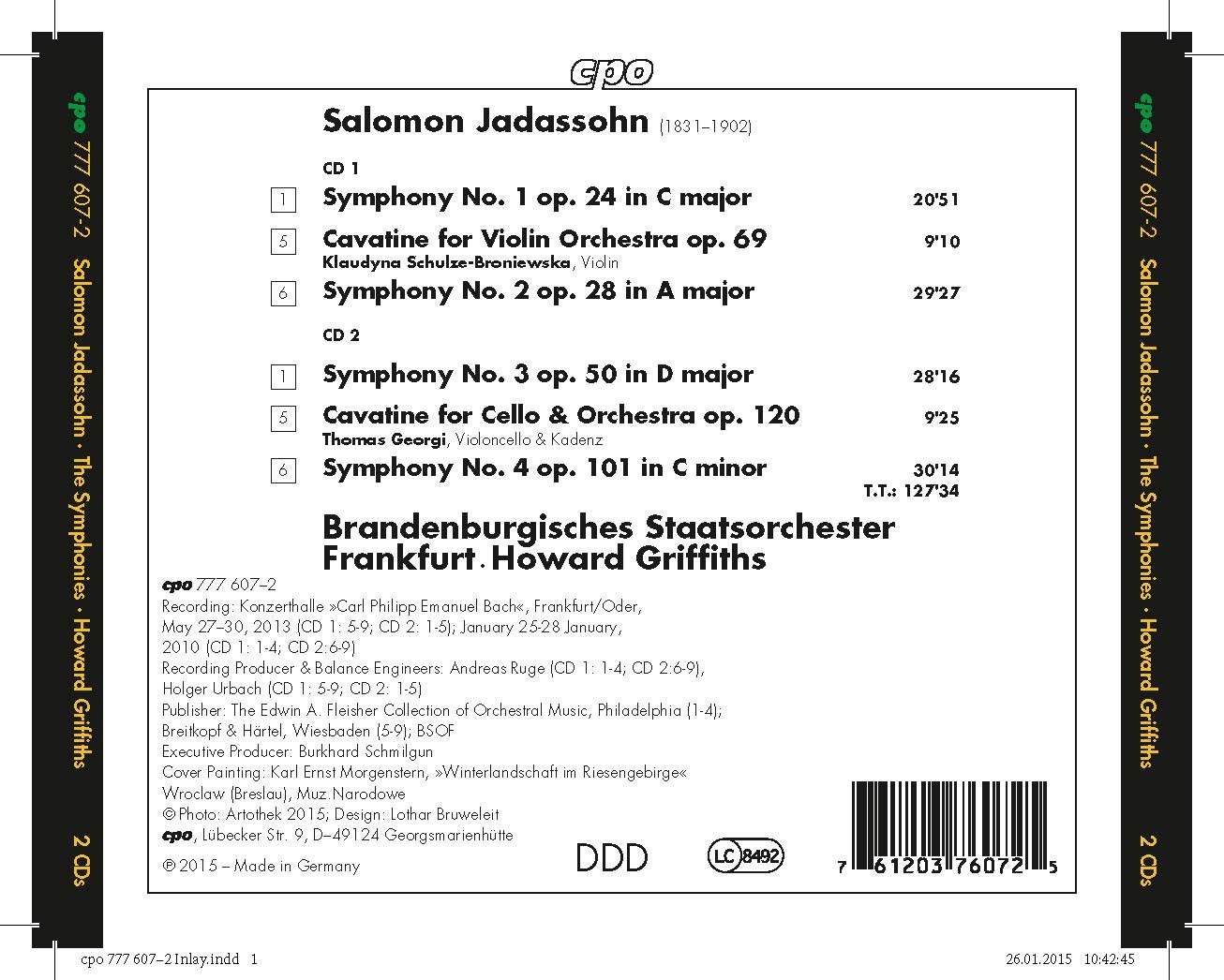Share This
Album at a Glance
Tags
Related Posts
- Arif Melikov (b.1933): Legend of Love, a ballet in three acts / Moscow Radio SO; Valery Gergiev
- A.H. Schultzen (1682-1762): Recorder Sonatas / Ensemble la Ninfea, Barbara Heindlmeier, recorder
- Franz Anton Hoffmeister (1754-1812): Sonatas for piano, Vol. 1 / Biliana Tzinlikova, piano
- Carson Cooman: ‘In Beauty Walking’ - Orchestral Works / Leah Crane, soprano; Chloé Trevor, violin
Salomon Jadassohn (1831-1902): Symphonies Nos. 1-4 / Brandenburg State Orchestra, Frankfurt; Griffiths
Posted by Paul Ballyk on May 23, 2015 in Romantic | 0 comments
Having fallen into obscurity shortly after the composer's death, the music of Salomon Jadassohn has enjoyed a re-evaluation in recent years. This cpo release was my first acquaintance with the German composer's music and based on the merits of what's to be heard here, Jadassohn's finely crafted and engaging music certainly deserves to be known by a much wider audience. In this program of the composer's four symphonies and two brief concertante works, the Brandenburg State Orchestra of Frankfurt is conducted by Howard Griffiths.
"Melody is the soul of a musical composition" wrote Salomon Jadassohn (1831-1902). He also confessed "I cannot develop any proper understanding for a certain manner of 'modern musical art.' I must assume that I have fallen behind the times." It's certainly true, Jadassohn's music is strongly modeled on that of the early Romantic era. To get a perspective on where Jadassohn fits into the dominant course of Western music, he completed his Third Symphony in 1876, the same year Brahms completed his Symphony No. 1 and his Fourth Symphony premiered in 1888, the year Mahler completed his Symphony No. 1. Jadassohn's Fourth is very much a tribute to Schumann and especially Mendelssohn. If you are listening to the audio sample in the right sidebar as you read this recommendation, you're hearing the opening movement of Jadassohn's Fourth Symphony.
As each a composer, conductor, music theorist and educator, Salomon Jadassohn achieved great success and was well respected during his lifetime. His students included Frederick Delius, Edvard Grieg and George Chadwick - all composers of tuneful, tonal music. Unfortunately however, his reputation as an educator may have worked against the endurance of his music, which was characterized by some to be academic and dry - labels easy to rationalize and ones that made an outright dismissal of his music seem appropriate.
There's no question, originality is not a distinguishing feature of this music, nor was it an objective in its design, but this doesn't rob it of any of its appeal. Listeners intrigued by the idea of hearing something fresh from the early Romantic period (interestingly, in this case, from a composer influenced by the music of Wagner and Liszt), will not be disappointed. There is much to be enjoyed here, and some sections are positively masterful.
Aside from the four symphonies, the program also includes two ten minute 'Cavatines' (compositions resembling an opera aria for an accompanied solo instrument), one for violin, and the other for cello. The fine soloists, violinist Klaudyna Schulze-Broniewska and cellist Thomas Georgi are section leaders in the Brandenburg State Orchestra of Frankfurt.
There is still very little of Jadassohn's music on disc. The composer's chamber works are held in higher regard, even than his orchestral music, and there are considerably more of them to be recorded than there are orchestral works. I hope the enterprising cpo label will record some of Jadassohn's chamber works in a continuing survey of his music.
Although Salomon Jadassohn continued to be known to generations of music students from his writings on music theory, above all from his Lehrbuch der Harmonie, issued in twenty-one printings after its publication in 1883, he unfortunately was quickly forgotten as a composer soon after his death. Next to Carl Reinecke, however, Jadassohn was regarded as the leading composer of the so-called Leipzig School, whose members continued on the path of musical romanticism on which Felix Mendelssohn and Robert Schumann had set out and were important influences in Leipzig’s music world for four decades.
Jadassohn studied with teachers such as Franz Liszt and was later an instructor in music theory, piano, and composition at the Leipzig Conservatory and enjoyed an outstanding reputation as an educator in the field of music. His pupils included many composers represented on cpo – such as Frederick Delius, Edvard Grieg, Ferruccio Busoni, Emil Nikolaus von Reznicek, Felix Weingartner, and Sigfrid Karg-Elert. In Jadassohn’s extensive and multifaceted oeuvre, including all the musical genres except the opera, his four symphonies composed during the twenty-eight-year period from 1860 to 1888 occupy an important place, though not a central one. His understanding of music tended toward the academic and craftsman-like (in the best sense of the term), which meant that he also viewed the symphonic genre as the expression and interplay of "forms moving in sound."
Source: cpo
_jpg/220px-Jadassohn_(young).jpg) Salomon Jadassohn |
Salomon Jadassohn, composer Salomon Jadassohn (13 August 1831, Breslau – 1 February 1902, Leipzig) was a German pianist, composer and a renowned teacher of piano and composition at the Leipzig Conservatory. Jadassohn was born to a Jewish family living in Breslau, the capital of the Prussian province of Silesia. This was a generation after the emancipation of the Jews in Central European German-speaking lands and during a time of relative tolerance. First educated locally, Jadassohn enrolled at the Leipzig Conservatory in 1848, just a few years after it had been founded by Felix Mendelssohn. There he studied composition with Moritz Hauptmann, Ernst Richter and Julius Rietz, as well as piano with Ignaz Moscheles. At the same time, he studied privately with Franz Liszt in Weimar. On 13 April 1851 in Weimar he was the soloist at the first performance, under Liszt’s baton, of Liszt’s arrangement for piano and orchestra of Carl Maria von Weber’s Polonaise (Polacca) brillante “L’hilarité” in E major, Op. 72. Because he was Jewish, Jadassohn could not qualify for the many church jobs as music directors or organists which were usually available to Christian graduates of a conservatory such as Leipzig, as they required deep knowledge of Christian liturgy and practice. Instead he worked for a Leipzig synagogue and a few local choral societies as well as teaching privately. Eventually, he was able to qualify for a position at the Leipzig Conservatory, teaching piano and composition. Over the years, he became a renowned teacher, and Edvard Grieg, Ferruccio Busoni, Frederick Delius, Paul Homeyer, Richard Franck, Sigfrid Karg-Elert, Ruben Liljefors, Emil Reznicek and Felix Weingartner were among his many students. Americans also studied with him, including the song composer Jean Paul Kürsteiner and George Strong, a composer of the late 19th and early 20th century. Source: Wikipedia |
 Howard Griffiths |
Howard Griffiths, conductor Howard Griffiths (born 24 February 1950) is a British conductor. Griffiths was born in Hastings. He studied music at the Royal College of Music, London. He has lived in Switzerland since 1981. Since the season 2007/08, he is General Music Director of the Brandenburg Staatsorchester, Frankfurt. in 2013, he renewed his contract for the third time until 2018. Howard Griffiths was Artistic Director and Principal Conductor of the Zurich Chamber Orchestra from 1996 to 2006 and successfully continued its long tradition of excellence in every respect. His work with the orchestra also involved extended tours of Europe, the United States and China, which were enthusiastically received by audiences and critics alike, both in Switzerland and abroad. Howard Griffiths has appeared as a guest conductor with many leading orchestras all over the world. These include the Royal Philharmonic Orchestra of London, the Orchestre National de France, Radio Moscow’s Tchaikovsky Symphony Orchestra, the Israel Philharmonic Orchestra, the Orchestra of the Age of Enlightenment, the Warsaw Philharmonic, the Basle Symphony Orchestra, the London Mozart Players, the Orquesta Nacional de España, the WDR Symphony Orchestra as well as other radio orchestras in Germany. In addition, he regularly works with youth orchestras, being a founder of the Jugend Symphony Orchestra Zurich and a regular guest with the National Youth Orchestra of Germany as well as periods with the Swiss Youth Symphony Orchestra and the National Youth Orchestra of South Africa. Source: Wikipedia |
 Brandenburg State Orchestra, Frankfurt |
Brandenburg State Orchestra of Frankfurt Founded in 1842, Brandenburgisches Staatsorchester Frankfurt (BSOF), comprising 86 regular musicians, is the largest symphonic orchestra of the State of Brandenburg. The BSOF sees itself as the official musical ambassadors of the country, and develops its regional, national and international presence on the concert stages in light of this mission. The orchestra has appeared as a guest in recent years in Poland, Lithuania, Israel, Russia, Spain, Italy, Belgium, Holland, France and Japan. Since the start of the 2007-2008 season, Howard Griffiths is Chief Conductor of the BSOF; in 2009 he was appointed General music Director. Together with the director Peter Sauerbaum, Howard Griffiths will substantially expand the already large range of the orchestra. In addition to the concerts in its native city of Frankfurt (Oder) the orchestra is also present in Brandenburg (concert series “Klassik unterwegs”, “Familienkonzerte unterwegs”). The orchestra has distinguished itself through its commitment to the performance of forgotten works and in the world premiere of works by new composers. Source: www.bach-cantatas.com |
![]() About Paul Ballyk
About Paul Ballyk
all about Paul
Twitter •
| Thinking about purchasing this album?
Follow this link for more album details or to make the purchase. Buy it now |
“Not just recommended. Guaranteed.”
We stand behind every album featured on Expedition Audio. Our objective is to take the monetary risk out of music exploration. If you order this album from HBDirect.com and do not like it you can return it for a refund.
Salomon Jadassohn: Piano Trio in E major Op.20 (1860)






